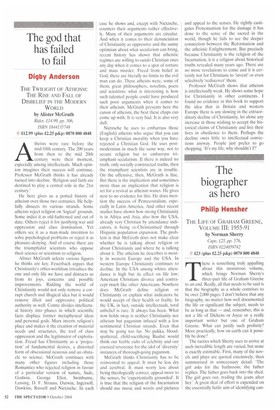The god that has failed to fail
Digby Anderson
THE TWILIGHT OF ATHEISM: THE RISE AND FALL OF DISBELIEF IN THE MODERN WORLD by Alister McGrath Rider. £14.99, pp. 306, ISBN 1844135748 ct £12.99 (plus £2.25 p&p) 0870 800 4848 Atheists were rare before the mid-18th century. The 200 years from then to the mid 20th century were their moment, especially among intellectuals. Much opinion imagines their success will continue. Professor McGrath thinks it has already turned into decline. 'Religion and faith are destined to play a central role in the 21st century.'
He here gives us a potted history of atheism over those two centuries. He helpfully dissects its various strands. Some atheists reject religion on 'logical' grounds. Some indict it as old-fashioned and out of date. Others reject it for justifying war and oppression and class domination. Yet others see it as a man-made invention to solve psychological problems or reject it as pleasure-denying. And of course there are the triumphalist scientists who oppose their science or scientism to religion.
Alister McGrath selects various figures he thinks are key. Feuerbach argues that Christianity's other-world ism trivialises the one and only life we have and distracts us from its joys, concerns and possible improvements. Ridding the world of Christianity would not only remove a corrupt church and illogical idea but it would remove illicit and oppressive political authority as well. Comte divides intellectual history into phases in which scientific facts displace former metaphysical ideas and personal gods. Marx inverts religion's place and makes it the creation of material needs and structures, the tool of class oppression and the legitimator of exploitation. Freud has Christianity as a 'projection' of fundamental desires, a distorted form of obsessional neurosis and an obstacle to science. McGrath continues with many other figures including those Romantics who rejected religion in favour of a particular version of nature, Sade, Godwin, George Eliot, Swinburne, Lessing, D. F. Strauss, Darwin, Ingersoll, Dawkins, Russell and Nietzsche. In each case he shows and, except with Nietzsche, counters their arguments rather effectively. Many of their arguments are circular. And when it comes to their denunciation of Christianity as oppressive and the sunny optimism about what secularism can bring, recent history has shown that atheistic regimes are willing to outdo Christian ones any day when it comes to a spot of torture and mass murder. Freed from belief in God, there are literally no limits to the evil man can do. These atheists were, some of them, great philosophers, novelists, poets and scientists; what is interesting is how such talented people could have produced such poor arguments when it comes to their atheism. McGrath presents here the canon of atheism, the best these chaps can come up with. It is very bad. It is also very dull.
Nietzsche he uses to embarrass those (English) atheists who argue that you can keep a Christian morality when you have rejected a Christian God. He uses postmodernism in much the same way, not to secure religion but to embarrass triumphant secularism. If there is indeed no truth, only socially constructed truths, then the triumphant scientists are in trouble. On the offensive, then, McGrath is fine. But there is the implication and sometimes more than an implication that religion is set for a revival as atheism wanes. He gives next to no evidence for this. He does mention the success of Pentecostalism, especially in Latin America. And other recent studies have shown how strong Christianity is in Africa and Asia, also how the USA, already very Christian by attendance indicators, is being re-Christianised through Hispanic population expansion. The problem is that McGrath does not make clear whether he is talking about religion or about Christianity and where he is talking about it. The atheism he describes is mostly in western Europe and the USA. In western Europe Christianity continues to decline. In the USA among whites attendance is high but its effect on life low: American Christians divorce and contracept much like other Americans. Nowhere does McGrath define religion or Christianity or explain what indicators he would accept of their health or frailty. In the UK, in fact, outside intellectuals, total unbelief is rare. It always has been. What now holds sway is neither Christianity nor atheism hut paganism infused with a few sentimental Christian strands. Even that may be going too far. No pukka, bloodspattered, child-sacrificing Baalist would think our feeble cults of celebrity and our coerced reverence for the idol of 'diversity' instances of thorough-going paganism.
McGrath thinks Christianity has to be reinvented to appeal. it must be less dry and cerebral. It must worry less about being theologically correct, appeal more to the senses, be 'experientially grounded'. It is true that the religion of the Incarnation should use music and words and pictures and appeal to the senses. He rightly castigates Protestantism for the damage it has done to the sense of the sacred in the world, though he fails to see the deeper connection between the Reformation and the atheistic Enlightenment. But precisely because Christianity is the religion of the Incarnation, it is a religion about historical truths revealed many years ago. There are no more revelations to come and it is certainly not for Christians to 'invent' or even selectively 'rediscover' them.
Professor McGrath shows that atheism is intellectually weak. He shows some hope for Christianity in other continents. I found no evidence in this book to support the idea that in Britain and western Europe there is any slowing in the extraordinary decline of Christianity, let alone any increase in those wishing to accept the historical claims of Christianity and live their lives in obedience to them. Perhaps the decline owes little to intellectual convictions anyway. People just prefer to go shopping. 'It's my life, why shouldn't I?'


















































































































 Previous page
Previous page